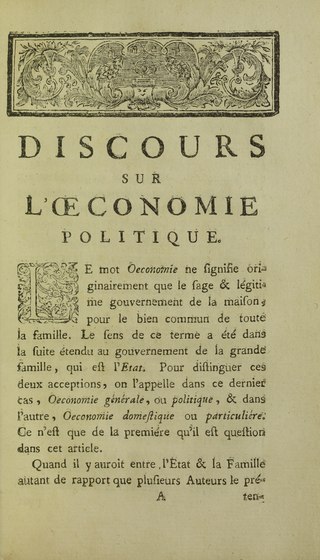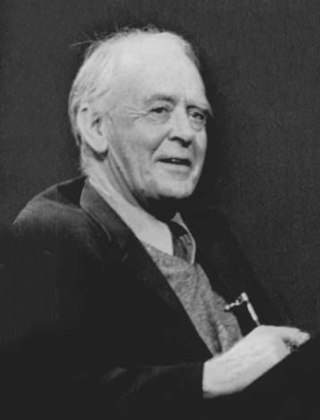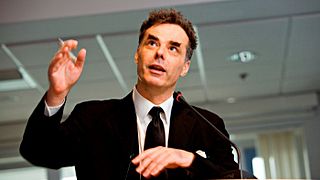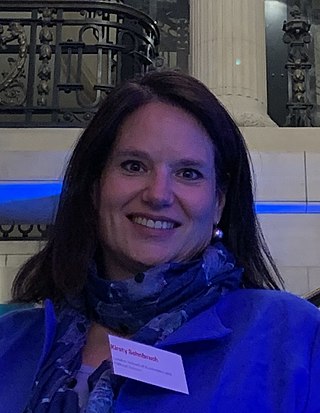
Political economy is a branch of political science and economics studying economic systems and their governance by political systems. Widely studied phenomena within the discipline are systems such as labour markets and financial markets, as well as phenomena such as growth, distribution, inequality, and trade, and how these are shaped by institutions, laws, and government policy. Originating in the 16th century, it is the precursor to the modern discipline of economics. Political economy in its modern form is considered an interdisciplinary field, drawing on theory from both political science and modern economics.
Post-Keynesian economics is a school of economic thought with its origins in The General Theory of John Maynard Keynes, with subsequent development influenced to a large degree by Michał Kalecki, Joan Robinson, Nicholas Kaldor, Sidney Weintraub, Paul Davidson, Piero Sraffa and Jan Kregel. Historian Robert Skidelsky argues that the post-Keynesian school has remained closest to the spirit of Keynes' original work. It is a heterodox approach to economics.

Sir John Richard Hicks was a British economist. He is considered one of the most important and influential economists of the twentieth century. The most familiar of his many contributions in the field of economics were his statement of consumer demand theory in microeconomics, and the IS–LM model (1937), which summarised a Keynesian view of macroeconomics. His book Value and Capital (1939) significantly extended general-equilibrium and value theory. The compensated demand function is named the Hicksian demand function in memory of him.
International political economy (IPE) is the study of how politics shapes the global economy and how the global economy shapes politics. A key focus in IPE is on the distributive consequences of global economic exchange. It has been described as the study of "the political battle between the winners and losers of global economic exchange."

John Leonard Eatwell, Baron Eatwell, is a British economist who was President of Queens' College, Cambridge, from 1996 to 2020. A former senior advisor to the Labour Party, Lord Eatwell sat in the House of Lords as a non-affiliated peer from 2014 to 2020, before returning to the Labour bench.

The European Structural and Investment Funds are financial tools governed by a common rulebook, set up to implement the regional policy of the European Union, as well as the structural policy pillars of the Common Agricultural Policy and the Common Fisheries Policy. They aim to reduce regional disparities in income, wealth and opportunities. Europe's poorer regions receive most of the support, but all European regions are eligible for funding under the policy's various funds and programmes. The current framework is set for a period of seven years, from 2021 to 2027.

Susan Strange was a British scholar who was "almost single-handedly responsible for creating international political economy." Notable publications include Sterling and British Policy (1971), Casino Capitalism (1986), States and Markets (1988), The Retreat of the State (1996), and Mad Money (1998).
Multi-level governance is a term used to describe the way power is spread vertically between many levels of government and horizontally across multiple quasi-government and non-governmental organizations and actors. This situation develops because many countries have multiple levels of government including local, regional, state, national or federal, and many other organisations with interests in policy decisions and outcomes. International governance also operates based on multi-level governance principles. Multi-level governance can be distinguished from multi-level government which is when different levels of government share or transfer responsibility amongst each other. Whereas multi-level governance analyses the relationship of different state levels and interaction with different types of actors.'

Immigration is the international movement of people to a destination country of which they are not usual residents or where they do not possess nationality in order to settle as permanent residents. Commuters, tourists, and other short-term stays in a destination country do not fall under the definition of immigration or migration; seasonal labour immigration is sometimes included, however.

Daniele Archibugi is an Italian economic and political theorist. He works on the economics and policy of innovation and technological change, on the political theory of international relations and on political and technological globalisation.
Peter Nedergaard is a Danish professor of political science who has been employed at the Department of Political Science at the University of Copenhagen since 2008. Peter Nedergaard is member of the Order of Dannebrog.
Brendan J Burchell is a professor at the Faculty of Human, Social, and Political Science at the University of Cambridge and a professorial fellow of Magdalene College, Cambridge. He was a director of graduate education in sociology 2008–2012 and head of the department of sociology from October 2012 to October 2014. Burchell is the current director of studies in politics and sociology for Magdalene College and was the director of the Cambridge Undergraduate Quantitative Methods Centre (CUQM) between 2014 and 2018.

Tanja A. Börzel is a German political scientist. Her research and teaching focus on the fields of European Integration, Governance, and Diffusion. She is professor of Political Science at the Otto-Suhr-Institute of Political Science of Freie Universität Berlin, director of the Center for European Integration, and holder of the Jean Monnet Chair for European Integration from 2006 until 2009. Currently, she is department chair of the Otto-Suhr-Institute of Political Science.

Simon Hix is a British political scientist, holder of the Stein Rokkan chair in comparative politics at the European University Institute in Florence. He was also Harold Laski Professor of Political Science and pro-director for research at the London School of Economics and Political Science. Hix is an expert in European Union politics, and the author of several books, including What's Wrong with the European Union and How to Fix It, Democratic Politics in the European Parliament with Abdul Noury and Gérard Roland, and The Political System of the European Union. He is also associate editor of the international peer-reviewed European Union Politics, and founder and chairman of VoteWatch Europe, an influential online EU affairs think-tank founded in London in 2009 that combines big data with political insight. After a first degree and a master's from the London School of Economics and Political Science, Simon Hix obtained a PhD in Political and Social Science at the European University Institute in Florence in 1995, and lectured in European Politics at Brunel University 1996–97, before joining the LSE in 1997. In this university he was promoted to professor in 2004, and served also as head of its department of government (2012–2015), academic director of its school of public policy (2017–2019), and pro-director for research from 2019. He finally was appointed Stein Rokkan chair of comparative politics at the European University Institute in Florence in 2021. His main areas of research are voting in parliaments, democratic institutions, and EU politics.

Kirsten Sehnbruch is a British Academy Global Professor and Distinguished Policy Fellow at the International Inequalities Institute at the London School of Economics and Political Science. Sehnbruch is known for her work on conceptualising and measuring the quality of employment, particularly in developing countries. Her research subjects include quality of employment, multidimensional indicators, Latin American labour markets, labour relations, Chilean politics and public policy.
James Raymond Hughes is professor of comparative politics at the London School of Economics (LSE). Hughes' research interests relate to political violence and terrorism, secession, national and ethnic conflict in the former Soviet Union, the Balkans, and Northern Ireland.
Yaprak Gürsoy is Professor of European Politics and the Chair of Contemporary Turkish Studies at the London School of Economics. Prior to joining the LSE she was a Senior Lecturer and the Undergraduate Programme Director of Politics and International Relations at Aston University, Birmingham. She previously worked as an associate professor in the Department of International Relations at the Istanbul Bilgi University and a senior member of the St Antony's College, Oxford University. Professor Gürsoy is also co-founder and co-convenor of The Turkish Politics Specialist Group of PSA.
Hanspeter Kriesi is a professor of political science at the European University Institute in Florence where he holds the Stein Rokkan Chair in Comparative Politics. Previously, he has been teaching at the universities of Amsterdam, Geneva and Zurich. He was born in Bischofszell, Switzerland.
Jill Rubery is a Professor of Comparative Employment Systems at Alliance Manchester Business School (AMBS) at the University of Manchester. Her research focuses on comparative analyses of employment systems with a specialisation in gender and labour market structure. She was made a fellow of the British Academy in 2006.

Nathalie Tocci is an Italian political scientist and international relations expert. She specializes in the role of the European Union (EU) in international affairs and peacekeeping, and the relationship between European states. She has served as the Director of the Istituto Affari Internazionali, and has also worked as an advisor to the government of Italy and to EU officials on foreign policy issues.











